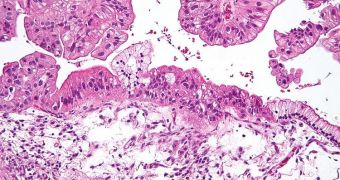According to a new scientific study, it would appear that four genetic variations can now be used to quantify women's risk of developing ovarian cancer at one point in their lives.
The work could in the near future lead to the development of a new series of tests, that could help experts detect women who are at increased risk of developing the dangerous condition.
Being informed of their elevated risk of cancer might make these women more inclined to follow a healthier lifestyle, and to stop eating junk food, or any other foods that are unfit for them.
Additionally, such knowledge would also give physicians a head start in developing a therapy against the condition, which would drastically increase survival rates in ovarian cancer patients.
Generally, this type of tumors is very difficult to detect in women, and is usually found after the cancer has already spread to other organs in the body. This is why the disease is often fatal.
Finding the cancerous cells before they have a chance to develop properly increases the chances that therapies doctors use actually work. Many cases could be cured if the cancer is treated aggressively from the first symptoms.
With the aid of the new tool, experts could make this a reality very soon. It is estimated that as much as 20 percent – 1 in 5 women – has these four genetic variants, which may make them more susceptible to developing ovarian cancer.
“Eventually, a woman can go to the clinic and, if she has family history, might be given a series of tests to look at changes” that may help quantify her risk for developing the condition, said expert Ellen Goode for MyHealthNewsDaily.
She is a part of the Ovarian Cancer Association Consortium, and holds an appointment as a research scientist and epidemiologist at the Mayo Clinic.
Details of the investigation were published yesterday, September 19, in the current issue of the esteemed scientific journal Nature Genetics.
“An important thing with this type of study is it's not saying you have a 100 percent chance that you will get ovarian cancer if you have changes, but you might have a slightly higher risk,” the expert adds.
According to Goode, the new discoveries unfortunately add additional credence to the idea arguing that ovarian cancer is hereditary.
“If you have a family history of ovarian cancer, you have a twofold chance of having it, too. Now we're learning more about why,” she concludes.

 14 DAY TRIAL //
14 DAY TRIAL //